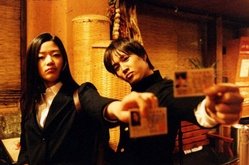Abroad He's a Tourist
I'll try to be a more frequent blogger from now on. (You're forewarned, RSS subscribers.) To kick things off, here's a belated, hastily written, mostly uneventful travelogue. You may wish to scroll through to see the pics, though.
Friday 4/14--Drive to FW. Attend Good Friday choral services at nearby Methodist church with Pablo's parents, Pablo himself putting in late hours at his corporate job. (I love the non-profit sector!)
Saturday 4/15--Wake up 4:00 am. Pablo drives me to airport. On the flight to O'Hare a Chinese-American woman and Shanghai native goes through my Frommer's guide and marks her recommendations. Meet up with brother in the terminal. 13 1/2 hr flight to Shanghai.
Sunday 4/16--Land in the afternoon at shiny new Pudong International Airport. Immigration and customs lines are blessedly short. After immigration I find a conveniently located Citibank ATM, from which I withdraw 2,400 RMB ($300). Exiting customs, my first experience of China is unsettling: we have to walk a winding gauntlet of railings against which are pressed throngs of people staring eagerly at the arriving passengers. Perhaps some of them are friends and family, but many of them are definitely transportation providers hungry for a fare. Some shove cards in our faces, some follow us for a short distance after entering the lobby, making their sales pitch in broken English. (This rite of passage sets a precendent for the rest of the trip.) We wave them off and find our way to the Maglev train station. 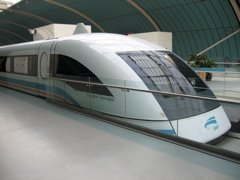
There's a big group of high school kids in blue blazers, but they're shunted off in another line and we can enter the platform area immediately. Waiting for the train, some old folks from the provinces (I'm guessing) examine the rails and talk in voices raised so loudly that they would seem almost angry. When the train finally arrives there is no polite, orderly queueing up; the crowds shove their way in, cutting in front of others, and by the time we less aggressive Americans get on board there are only two seats left, next to a family of Spaniards. The train ride is smooth and brief, peaking at 430 km/h.
The Maglev stops at a Metro station, where we struggle trying to figure out the card dispenser. Finally we get it to work and take the subway. The cars are clean, and inside there are plasma TVs showing advertisements--I'm surprised at this symptom of consumerism, but mesmerized by an ad for a digital camera in which a sexy leather-clad woman prances around the city. We get off at the People's Square station next to the Yangtze Hotel, where we're staying, near the famous Nanjing Lu pedestrian mall. Check in--the hotel staff, all attractive young women in uniform, know enough English to get us settled in. Watch a little TV, including the faintly propagandistic English-language CCTV9 (all week they'll be vaunting China's improvements in intellectual property rights enforcement, in connection with President Hu's visit to the U.S.) and CCTV11, all Chinese-opera, all the time.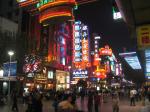 As night falls we decide to walk the famous Nanjing Lu and find something to eat. The crowds and the neon lights are impressive, but the shops are uninteresting and every hundred feet or so we're harassed by pimps, prostitutes, fake-watch salesman, waiters, etc., whose English consists of "Hello" and the name of their product or service. ("Hello, massage," "Hello, sex," "Hello, Rolex watch," "Hello, coffee and beer.") An unpleasant experience. We eventually head back to the less crowded western part of Nanjing Lu, take a side street which a neon-inscripted arch proclaims as "Lie Fallow Street," and find a restaurant with invitingly bright lighting and decor (yellow tablecloths, red paper lanterns). We're a bit put off by the fact that the waitresses hover over our shoulders while we peruse the menu, especially given the fact that it takes us a while to figure out exactly what is being portrayed in the small, fuzzy photographs. (We pass on the goose claw.) The prices are so low we figure the portions must be tiny, so we order three dishes for the two of us and are shocked at the enormous quantities when they arrive. Plus big 650ml Tsingtaos were only a buck and a half. Beef and noodle stew with lip-numbing Sichuan peppercorn, mustard greens, something else. Head back to the hotel.
As night falls we decide to walk the famous Nanjing Lu and find something to eat. The crowds and the neon lights are impressive, but the shops are uninteresting and every hundred feet or so we're harassed by pimps, prostitutes, fake-watch salesman, waiters, etc., whose English consists of "Hello" and the name of their product or service. ("Hello, massage," "Hello, sex," "Hello, Rolex watch," "Hello, coffee and beer.") An unpleasant experience. We eventually head back to the less crowded western part of Nanjing Lu, take a side street which a neon-inscripted arch proclaims as "Lie Fallow Street," and find a restaurant with invitingly bright lighting and decor (yellow tablecloths, red paper lanterns). We're a bit put off by the fact that the waitresses hover over our shoulders while we peruse the menu, especially given the fact that it takes us a while to figure out exactly what is being portrayed in the small, fuzzy photographs. (We pass on the goose claw.) The prices are so low we figure the portions must be tiny, so we order three dishes for the two of us and are shocked at the enormous quantities when they arrive. Plus big 650ml Tsingtaos were only a buck and a half. Beef and noodle stew with lip-numbing Sichuan peppercorn, mustard greens, something else. Head back to the hotel.
Mon 4/17--We devote the morning to the Bund area, the strip of colonial buildings along the Pudong river. To get there we walk on Hankou Lu, parallel to but more workaday than Nanjing Lu. Traffic is chaotic, crossing the street can be perilous, the boundaries between sidewalk and road, and between lanes in the road, are not completely respected, and a variety of vehicles share the street: cars, buses, scooters, bicycles, pedicabs, pedal-powered and even hand-drawn carts. A man follows us for about a block offering to shine my brother's scuffed-up boots.  We arrive at the Bund and look at the buildings for a little bit, then cross the river using the kitschy underground "sightseeing tunnel" which tries to dazzle with lasers, neon, strobe lights, mirrors, dry ice, and writhing wind sock stick figures, enjoyed from the glass bubble of a futuristic tram. We walk a few blocks, fending off the usual scammers, to the Pearl Tower, a Space-Needle sort of attraction.
We arrive at the Bund and look at the buildings for a little bit, then cross the river using the kitschy underground "sightseeing tunnel" which tries to dazzle with lasers, neon, strobe lights, mirrors, dry ice, and writhing wind sock stick figures, enjoyed from the glass bubble of a futuristic tram. We walk a few blocks, fending off the usual scammers, to the Pearl Tower, a Space-Needle sort of attraction.  Choked with tourists, including hundreds of schoolgirls in identical uniforms, it takes us probably twenty minutes to get to the elevator and up to the observation deck.
Choked with tourists, including hundreds of schoolgirls in identical uniforms, it takes us probably twenty minutes to get to the elevator and up to the observation deck.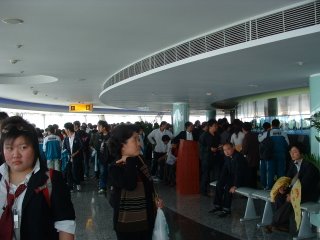 But it's worth it, after all, for the great views of the skyline, including the gleaming new skyscrapers of the Pudong Development.
But it's worth it, after all, for the great views of the skyline, including the gleaming new skyscrapers of the Pudong Development. 

From the Bund we walk south to Nanshi, i.e. Shanghai's "Old Town." (It ends up being a lot longer of a hike than appeared on the small Frommer's map of the neighborhood; in fact, all the walking we did on this trip probably explains why I lost six pounds despite eating stir fry and drinking beer every day.) Nanshi is a lot like Albuquerque's Old Town, or the historical quarter of Prague--beautiful old buildings occupied by gift shops. 
Our first stop is a hotel restaurant recommended by Frommer's, which we find only after walking the entire length of Nanshi down a narrow alley and backtracking (not the first time this would happen, given our lack of Chinese.) It ends being on the very street corner where we entered Nanshi in the first place. 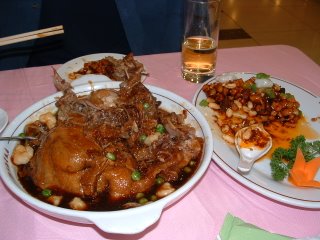 There, in a spacious and elegant dining room we have the recommended speciality, the "Eight Treasures Chicken" and a side dish with a similarly florid name I can't remember now. My brother says that a table full of old Chinese behind me stares at us the enitre meal.
There, in a spacious and elegant dining room we have the recommended speciality, the "Eight Treasures Chicken" and a side dish with a similarly florid name I can't remember now. My brother says that a table full of old Chinese behind me stares at us the enitre meal.
After lunch we walk around the area. Besides the gift shops selling silks, name seals, dolls, reproductions of old Shanghai advertising posters, copies of the Red Book in various languages, etc., there is a famous teahouse in the middle of a pond--but my brother, disliking hot tea, isn't interested. We also visit a temple which had this curious deity on display behind glass.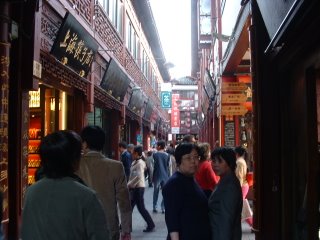

I also see this--although Texas is DQ country, I don't expect to find it offered here anytime soon. 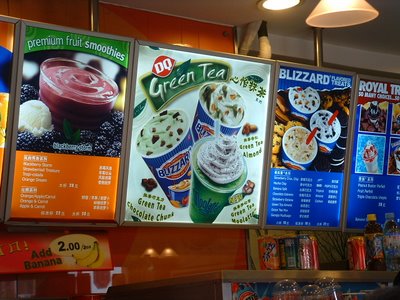
In the afternoon we make the long hike back to the hotel. After kicking back and watching more bad Chinese TV, we decide to check out some nearby multilevel department stores, but are disappointed to find them far inferior to their Japanese counterparts. In the last one we decide to eat, but the food court on the top floor is nearly deserted. Only two the restaurants are open, and the hostess of one, as soon as she see us approach, rushes up with an open menu and urges us toward her establishment, "Me & Joe." Since their next-door rival had an unappealing name like "Herb World" or something like that, we acquiesce. "Me & Joe" offers western food in a cafe setting, small tables and plush chairs. We get some pizzas which turn out to be only mediocre. The waitress comes out with a carrot cake and explains in pretty good English that it is compliments of the chef, who also wants to know if we thought the food was "delicious." Being polite, and also not wanting to be ungrateful for the free dessert, we assent.
Tues 4/18--Today we devote to the Shanghai museum, which the travel guides recommend highly. Unfortunately we don't find it to be very interesting. There is a nice little collection of Buddhist statuary, but the pots, scrolls, furniture, and coins leave us bored. However, it is interesting to see, and in some cases smell (French) the mix of nationalities among the visitors. We also purchase souvenir T-shirts in the gift shop, so the museum fulfills one very important purpose in any vacation (especially since we don't see any other reasonably tasteful T-shirts for sale during the rest of the trip). And on our walk to the museum we are privileged to see a political dissident hauled off, surely an essential part of any China tour. A middle aged man stands under a flagpole in front of some sort of government building and unfurls a homemade banner with a hand painted message. Immediately the passersby stop and stare as police rush up to him and lead him away. I consider taking a snapshot of the proceedings but I fear that my camera will be confiscated, or worse. 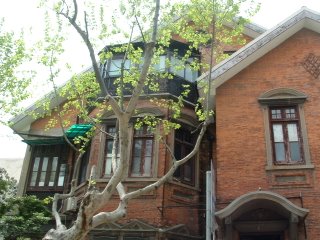 In the afternoon we follow Frommer's suggested walking tour of the "French concession," which also turns out to be a bit dull. It's mostly a sleepy residential neighborhood with the occasional mildly interesting colonial home. The Xintiandi area, in which some of these homes have been converted to pricy eateries, was nothing special either--and the Paulaner beer garden was charging $8 per glass! We also spend over an hour walking around trying to find a Communist Poster Museum listed in one of the travel guides, to no avail. So we resignedly trudge back to the People's Square area and take a late lunch at our standby restaurant, ordering the famous "squirrel fish":
In the afternoon we follow Frommer's suggested walking tour of the "French concession," which also turns out to be a bit dull. It's mostly a sleepy residential neighborhood with the occasional mildly interesting colonial home. The Xintiandi area, in which some of these homes have been converted to pricy eateries, was nothing special either--and the Paulaner beer garden was charging $8 per glass! We also spend over an hour walking around trying to find a Communist Poster Museum listed in one of the travel guides, to no avail. So we resignedly trudge back to the People's Square area and take a late lunch at our standby restaurant, ordering the famous "squirrel fish":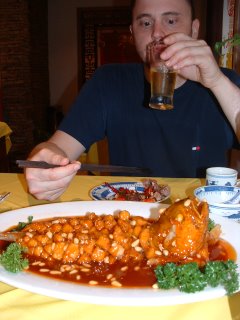
In the evening we don't have much to do, so we take the metro out to Pudong to check some more shopping malls that Frommer's recommended, but they again fail to impress. However, walking from the metro station to the malls, we see another typical Chinese event: cops chasing off streetside vendors of counterfeit western goods. The vendors are prepared for the bust: they simply lift the corners of the blanket on which their wares rest and tote the bundle off to another street corner a few blocks away, where they set up shop again. There's even music to enliven the shopping experience, provided by a battery-powered cannon-style speaker tied to the back of a bicycle.
In one of the shopping malls we get hungry and eat at "Belinda's," which looks somewhat similar, though larger and busier, to "Me & Joe." The language barrier proves difficult however. When we approach the hostess she points to the pizza section on the menu and makes negative gesture. No pizzas? Fine with me, after the experience at Me&Joe. After we're seated a waitress arrives and points to the pizza section and says something in Mandarin. We shrug. Eventually in frustration she gets a waiter who knows a little English. "One pizza," he says over and over. Huh? We persistenly point to the pasta dishes we want, which seems to be problematic but eventually the waiter gives up the "one pizza" mantra and walks off. I'm still not sure what the problem was, but we got our pasta, which ended up being about $1.50 a plate!
In sum, probably our least entertaining day in China except perhaps for the last.
Wednesday 4/19--Today we take a train into the famous lakeside city of Hangzhou. The hotel staff bought our train tickets for us the day before--well worth the service fee they chared. The bellhop hails us a cab, which takes us to an underground parking beneath the train station. Some guys in blue shirts with badges around their necks grab our luggage as soon as the cab stops, drag it to a booth, ask to see our tickets, and then demand 150 RMB. We try to figure out the reason for this charge but the only English word they know (apparently) is "Pay!" A German tourist comes up and pays so we ask him what is going on. He says something about tickets, so we figure this is legit and pay up as well. The guys take our luggage and lead us up an escalator and through a security checkpoint to a crowded waiting area, where they hang around with us for an hour until boarding. At this point we've figured out that these guys are merely coolies and that we got ripped off--probably the taxi driver got a kickback too. Nevertheless, they did provide us a convenient service, leading us through the mob onto the correct car and seat, talking to a fellow passenger to switch seats with my brother (since the hotel had not got us tickets right next to each other), and hefting our luggage into the overhead rack.
On the 2 1/2 hr. train ride there are other money-making ploys. Aside from the snack and drink carts, there is a sales pitch by a stewardess talking into a bullhorn, apparently for Hangzhou tour groups, and then another stewardess spends fifteen minutes demonstrating the fun you can have with Rubik's snakes! Amazingly, she sells a few. I just look at the scenery, which includes square miles of identical, newly erected apartment buildings apparently in the middle of nowhere. My brother says that a Chinese worker told him that the "company town" is alive and well in China--monuments to Wal-Mart money. 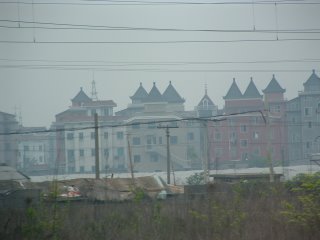
Arriving in Hangzhou, we get a taxi to our hotel, the appropriately named West Lake Hotel, across the street from the northern shore of said lake. After settling in, we decided to take a walk along the park on the northeast edge of the lake. The weather is perfectly temperate, the lakeshore is lush and leafy, and though the park is crowded with people, there aren't any annoying scam artists harassing us. There is a sort of impromptu festival atmosphere, with small clusters of people here and there gathered around a fierce Chinese chess match, a folk concert of singing and fiddle playing, an exhibition of sword play, or a heated but friendly debate between two elders. I also see what may be the most luxurious Starbucks in the world.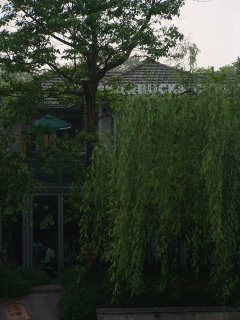 We stop to look around a quiet temple. Walking back to the hotel through a neighborhood modeled after the aforementioned Xintiandi, we stop by a swanky-looking restaurant, the "Crystal Jade something-or-other." I order a local speciality, "West Lake Sweet and Sour Fish," which is pungent with the smell of vinegar, a real turn-off for my olfactorally hypersensitive brother.
We stop to look around a quiet temple. Walking back to the hotel through a neighborhood modeled after the aforementioned Xintiandi, we stop by a swanky-looking restaurant, the "Crystal Jade something-or-other." I order a local speciality, "West Lake Sweet and Sour Fish," which is pungent with the smell of vinegar, a real turn-off for my olfactorally hypersensitive brother. 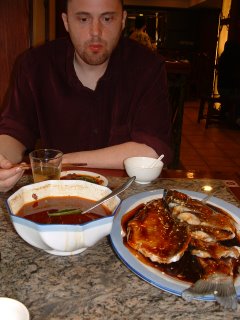 The Chinese are not respecters of privacy, and as I am reading the bilingual food section of Frommer's, I feel a presence over my shoulder and find that four of the waitresses are gathered behind me, fascinated to see what Chinese dishes the book recommends. One of them tries out some English on me. "My name is [Linda?]." I say "Hello, Linda" and they think my pronunciation of that name is hilarious, and the others taunt her with it long afterwards.
The Chinese are not respecters of privacy, and as I am reading the bilingual food section of Frommer's, I feel a presence over my shoulder and find that four of the waitresses are gathered behind me, fascinated to see what Chinese dishes the book recommends. One of them tries out some English on me. "My name is [Linda?]." I say "Hello, Linda" and they think my pronunciation of that name is hilarious, and the others taunt her with it long afterwards.
After we get back to the hotel I fell asleep ridiculously early.
Thur 4/20--After a nice breakfast in the hotel, we hike around the lake. At the entrance to a causeway there are some people hawking tour van rides, and one old woman seemed to be wanting to sell us tickets on the city bus, but once we get on the causeway we leave that behind. 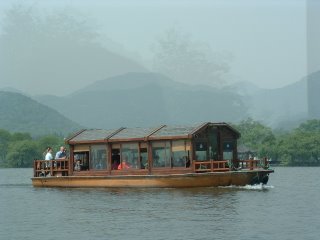
A long walk and we arrive at some tour boats, which take us to a series of little islands in the lake with pavilions and gardens on them. On the first and smallest of these there are a couple of gift shops (surprise, surprise!) with salespeople tootling on pennywhistles. The language barrier proves a problem when we can't figure out which boat to get on to get to the other end of the lake, so we end up going back to the beginning. What's worse, we share this boat with a tour group, and the leader bellows into a microphone connected to a speaker on her belt pointed directly at my ear. China is by far the noisiest country I've ever been to.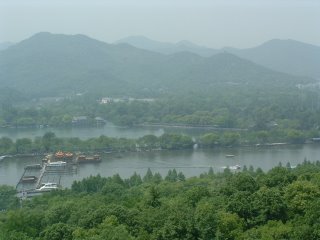
Upon disembarking we continue walking along the lake, towards a pagoda on the southeast shore. Along the way we cut our way through a tour group of old folks in identical red baseball caps, and three young joes from the hinterland are astounded to see westerners and urged me to have their pictures taken with me--so maybe at this moment I'm displayed on someone's mantlepiece in Inner Mongolia.
It's a long walk to the pagoda, and I am annoyed that we hadn't rented a bike or some other form of transportation, but eventually we arrive and hike up to the top for a attractive view of the lake and environs.
Tired of walking, we take a taxi from the pagoda to Hangzhou's Qing Hefang Historical Street, which turns out to be just a smaller version of Shanghai's Nanshi. We grab lunch at a random place across from an Irish pub housed in some colonial-style building. The waitress shakes her head when we point to Tsingtao on the menu, so we end up with an undistinguished local brew. The tofu-wrapped spring rolls are nothing special either. 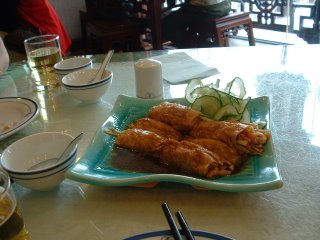 We decide to hoof it back to the hotel rather than take the taxi, just to see what can be seen. Some sort of big event with tents, a giant inflatable cartoon waterdrop, kids in identical T-shirts. (My brother's coworker, seeing a photo of the affair, surmised that it was somehow connected with the '08 Olympics.) Not much seems to be of interest as we head up Yan'an Lu, but we stop into a Carrefour, sort of a Super Wal-Mart, to ogle at the weird stuff in the meat and fish department--yard-long eels, bundles of dried ducks. I also buy some fine alcohol and tea--with the friendly but aggressive prompting of some of the staff. (It's hard to browse shops in China without getting the hard sell.)
We decide to hoof it back to the hotel rather than take the taxi, just to see what can be seen. Some sort of big event with tents, a giant inflatable cartoon waterdrop, kids in identical T-shirts. (My brother's coworker, seeing a photo of the affair, surmised that it was somehow connected with the '08 Olympics.) Not much seems to be of interest as we head up Yan'an Lu, but we stop into a Carrefour, sort of a Super Wal-Mart, to ogle at the weird stuff in the meat and fish department--yard-long eels, bundles of dried ducks. I also buy some fine alcohol and tea--with the friendly but aggressive prompting of some of the staff. (It's hard to browse shops in China without getting the hard sell.) For dinner, we walk along the causeway again to a restaurant Frommer's recommended, where we have beggar's chicken, baked in clay-caked newspaper and plastic bag. We are the spectacle of the dining room when the waiter comes out and cuts open the charred package for the foreigners. Again the waitress shakes her head when we try to order Tsingtao--is it a Hangzhou ordinance that no Tsingtao will be served on Thursdays? The walk back along the causeway that evening is beautiful, with the lights of pavilions and tea houses reflected on the lake and the leaves of the trees glowing from floodlights shining beneath them. Unfortunately I can't get a good picture without a tripod.
For dinner, we walk along the causeway again to a restaurant Frommer's recommended, where we have beggar's chicken, baked in clay-caked newspaper and plastic bag. We are the spectacle of the dining room when the waiter comes out and cuts open the charred package for the foreigners. Again the waitress shakes her head when we try to order Tsingtao--is it a Hangzhou ordinance that no Tsingtao will be served on Thursdays? The walk back along the causeway that evening is beautiful, with the lights of pavilions and tea houses reflected on the lake and the leaves of the trees glowing from floodlights shining beneath them. Unfortunately I can't get a good picture without a tripod.
Fri 4/20--We take the train to Suzhou, famous for its classical gardens and its canals. Again we rely on the hotel staff to get our tickets for us--although there is some worry on Thursday because at late as 5 p.m. we are told that the tickets would be "late," and that "maybe" we could pick them up before the office closed at 6:00, all of which sounds ominously like Asian face-saving excuses. But in the end all is well. Suzhou is back towards Shanghai, so we see the same scenery but we don't fortunately have to sit through the same sales spiels. Walking out of the Suzhou train station, we see what my brother later describes as a "third world scene": noisy masses of shabbily-dressed people gathered outside the station, and across the road, a row of grimy buildings. A driver hounds us to employ his services, but forewarned by the travel guide we decline and flag a passing cab to get to our hotel. After checking in, we walk to the nearby "Master of the Nets" Garden, but again the map is too simplified and we overshoot it. When we finally find it, it's a bit of a disappointment; though highly recommended by the travel guides, it's small and kind of drab.  The street we walk along, though, is interesting for being lined with traditional Chinese architecture, and there's an unusual amount of green (compared to Shanghai, anyway). I stop into a convenience store to buy an umbrella because I had seen on the news that rain was predicted for the area. Indeed, about ten minutes later it comes down in buckets. When we finally make it back to the hotel we change into dry clothes and watch TV until the rain lets up. We walk to the Suzhou "gourmet" street, a restaurant-lined block in a larger pedestrian mall built around the "Temple of Mystery." We look for a restaurant recommended by the travel guide but after a half hour of futile searching we stop into a lively-looking establishment with a big screen TV broadcasting a soccer match. We get "golden fragrance tofu," which my nose immediately recognizes as what the Taiwanese more forthrightly call "stinky tofu," and a fatty block of glazed pork. After dinner we browse a bookshop (but no foreign language titles) and a department store before walking back to the hotel.
The street we walk along, though, is interesting for being lined with traditional Chinese architecture, and there's an unusual amount of green (compared to Shanghai, anyway). I stop into a convenience store to buy an umbrella because I had seen on the news that rain was predicted for the area. Indeed, about ten minutes later it comes down in buckets. When we finally make it back to the hotel we change into dry clothes and watch TV until the rain lets up. We walk to the Suzhou "gourmet" street, a restaurant-lined block in a larger pedestrian mall built around the "Temple of Mystery." We look for a restaurant recommended by the travel guide but after a half hour of futile searching we stop into a lively-looking establishment with a big screen TV broadcasting a soccer match. We get "golden fragrance tofu," which my nose immediately recognizes as what the Taiwanese more forthrightly call "stinky tofu," and a fatty block of glazed pork. After dinner we browse a bookshop (but no foreign language titles) and a department store before walking back to the hotel.
Sat. 4/21--More gardens. We trek south and, after crossing the river and crossing back, then swinging a left down a narrow street, past a pungent food market, we make it to the pagoda and garden. The grounds are spacious and well-manicured, and the 9th-century pagoda fulfills the same function that cathedral bell towers did in Europe--providing an apprehensive climb up a steep, narrow staircase for a panorama view of the environs. Hiking around the central city, we visit three other gardens, crowded with the usual tour groups. The first one is the nicest, with musicians in traditional garb playing classical instruments. For dinner we finally find the restaurant that was recommended by the travel book--the problem was that the sign over the door read right to left, something the book didn't mention. But it's a disappointment--the food was expensive (by Chinese standards) and bland (by anyone's standards).
Sun. 4/22--Final day in China, and it turns out to be a bit of an anticlimax. We take the short train ride from Suzhou to Shanghai. After checking back into the Yangtze Hotel, we take a long hike south towards the Longhua Temple, where there is supposed to be a festival. On the way down there we pass the Shanghai stadium, where there is some sort of NFL-sponsored event occurring, youth in practice gear tossing footballs and running scrimmages. The Longhua Temple fair is absurdly crowded--we actually don't get near the temple itself, but after being crushed in a logjam of people shopping for cheap merchandise between a row of booths, we give up and enter a nearby restaurant for lunch. Actually we walk into a humble basement establishment, and the restauranteur leads us next door to a fancier place. No foreigners allowed in the cheap places? Anyway, the meal is quite good; here it is: 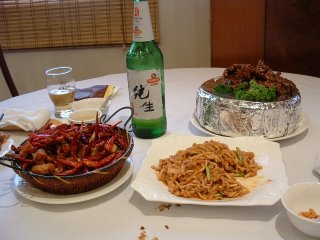 After hiking back uptown it's late afternoon. Having run out of tourist spots, we decide to spend the last evening looking for souvenirs, but don't have much luck. The Friendship Store is fairly tacky, and unnerving besides, with no customers and dozens of employees loafing around. Other shops don't have anything that looks appropriate for gift-giving (no one I know would want a gift box of dried squid, I don't think). The one thing that makes our walk back to the hotel at nightfall interesting is a street (I think Jinling Dong Lu) lined with shops carrying Chinese classical music instruments.
After hiking back uptown it's late afternoon. Having run out of tourist spots, we decide to spend the last evening looking for souvenirs, but don't have much luck. The Friendship Store is fairly tacky, and unnerving besides, with no customers and dozens of employees loafing around. Other shops don't have anything that looks appropriate for gift-giving (no one I know would want a gift box of dried squid, I don't think). The one thing that makes our walk back to the hotel at nightfall interesting is a street (I think Jinling Dong Lu) lined with shops carrying Chinese classical music instruments.
Mon 4/23--Back to the States.
